Check out Issue 4 of the Periclean Scholars Newsletter! It will be the FinalNewsletter published for the academic year!
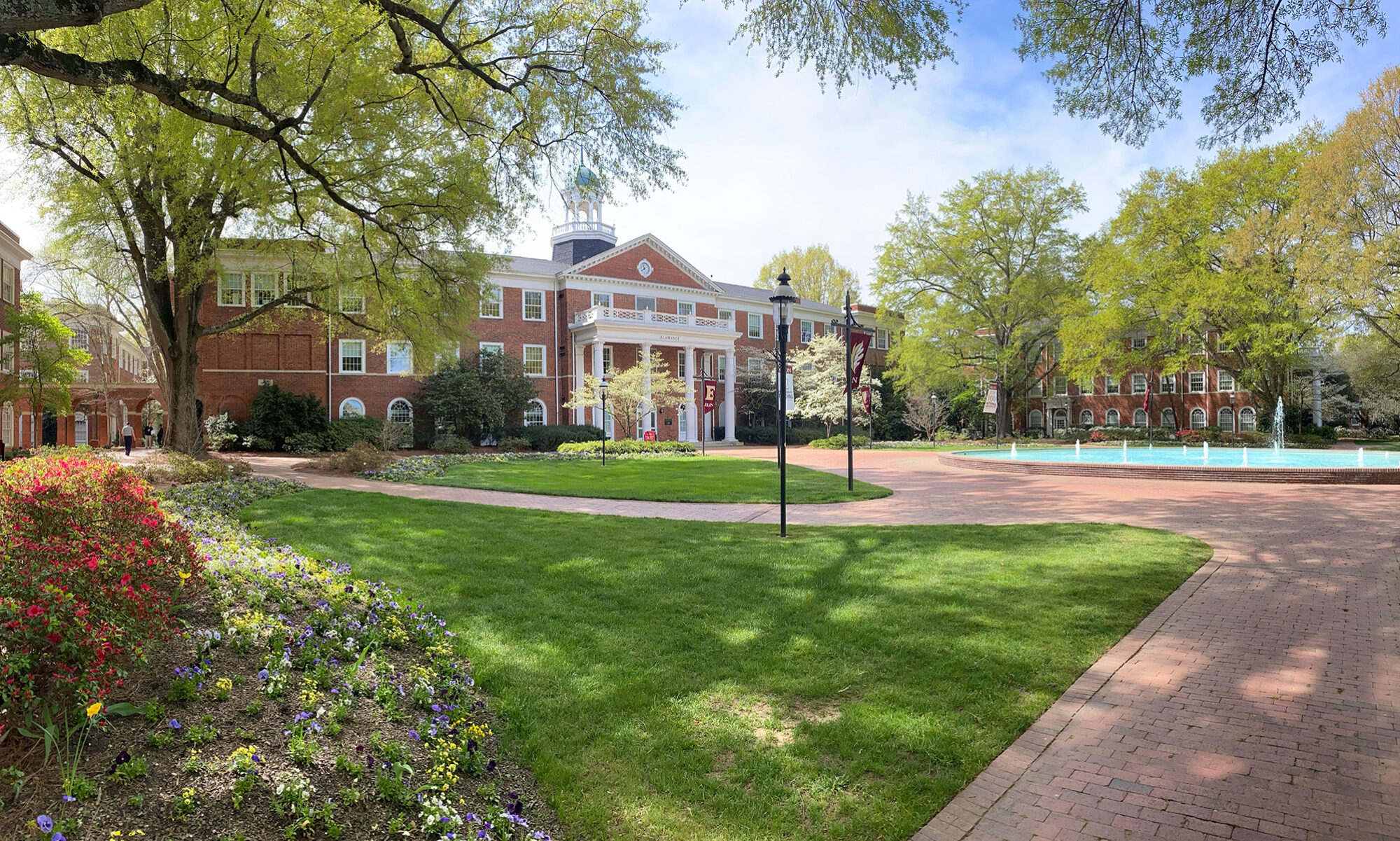
You will be forwarded to the new site in 10 seconds.
Please bookmark the new location.
Check out Issue 4 of the Periclean Scholars Newsletter! It will be the FinalNewsletter published for the academic year!
Click on the hyperlink to view the most recent issue of the Periclean Newsletter!
I pose this question as we are about to welcome back to Elon two ’17’s that just spent about two weeks in Namibia and as the ’19’s are in the preliminary stages of sending part of their Class to Sri Lanka.
First, what are the costs of this travel?
So, if the cost is so high, what is the value of this travel to your country of focus that offsets all of the above costs?
Above all, any travel by Pericleans must be and be seen as adhering to the highest possible ethical standards in terms of cultural contact and relations with any partners. Full transparency of motivations must exist and be communicated both to Classmates and to all partners either pre-established or developed as the travel proceeds.
The Periclean Pledge (revised and posted here soon) and the Core Humanitarian Standards must guide and inform all actions and decisions.
This is the first in a short series of posts providing updates about our partners around the world.
Working with the global indigenous rights community in support of Standing Rock
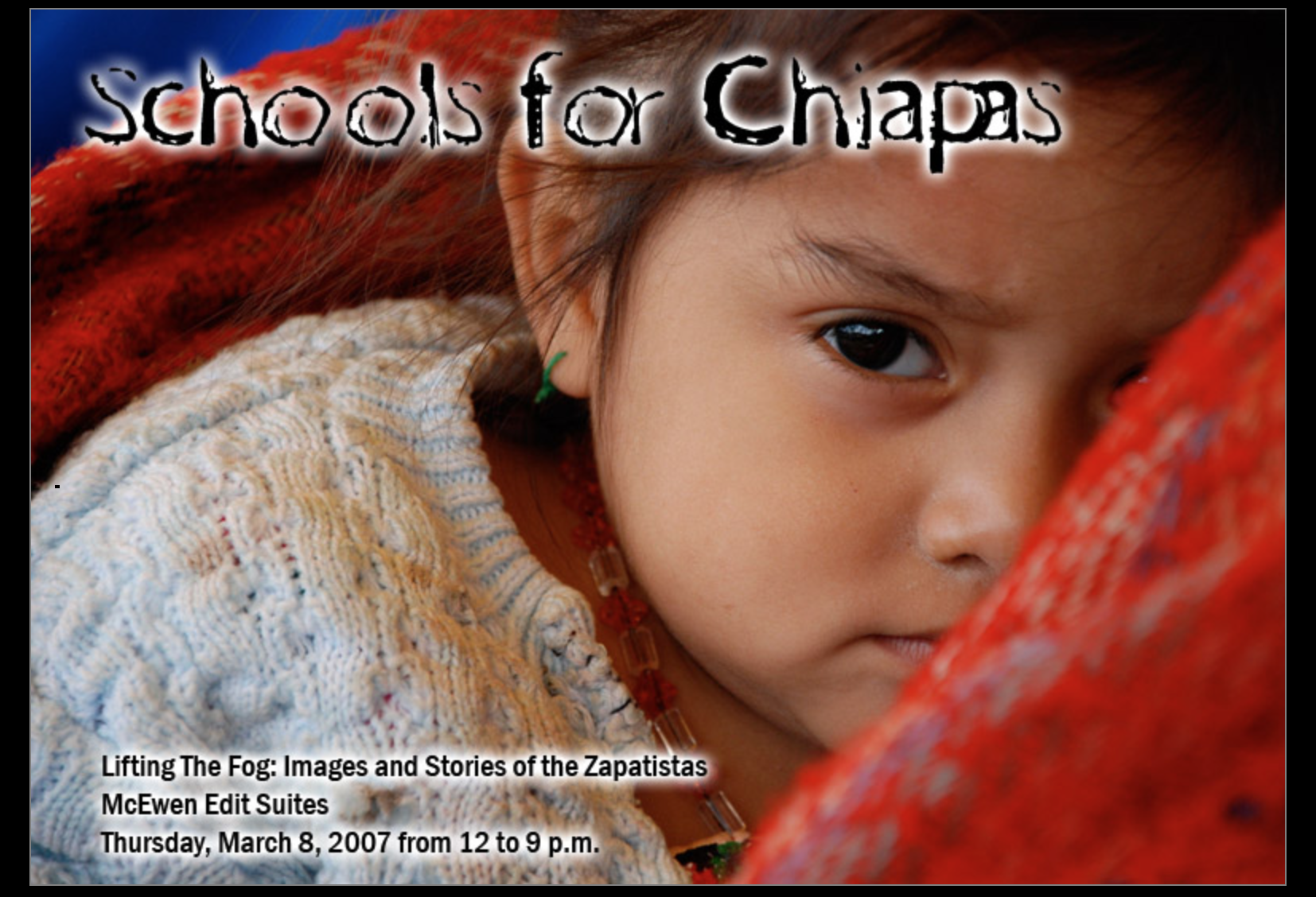
Sue Beattie and Peter Brown partnered with the Class of 2008 as they worked in Chiapas, Mexico with the indigenous Mayans. One product of that partnership was the documentary film Painting Without Permission highlighting the work that the Class of 2008 did with the Zapatistas and Schools for Chiapas.
Recently Peter and Susan traveled to Bismarck, ND and became part of the movement in support of the Standing Rock Souix Tribe against the Dakota Access Pipeline
Here is Susan’s Facebook post describing their experience:
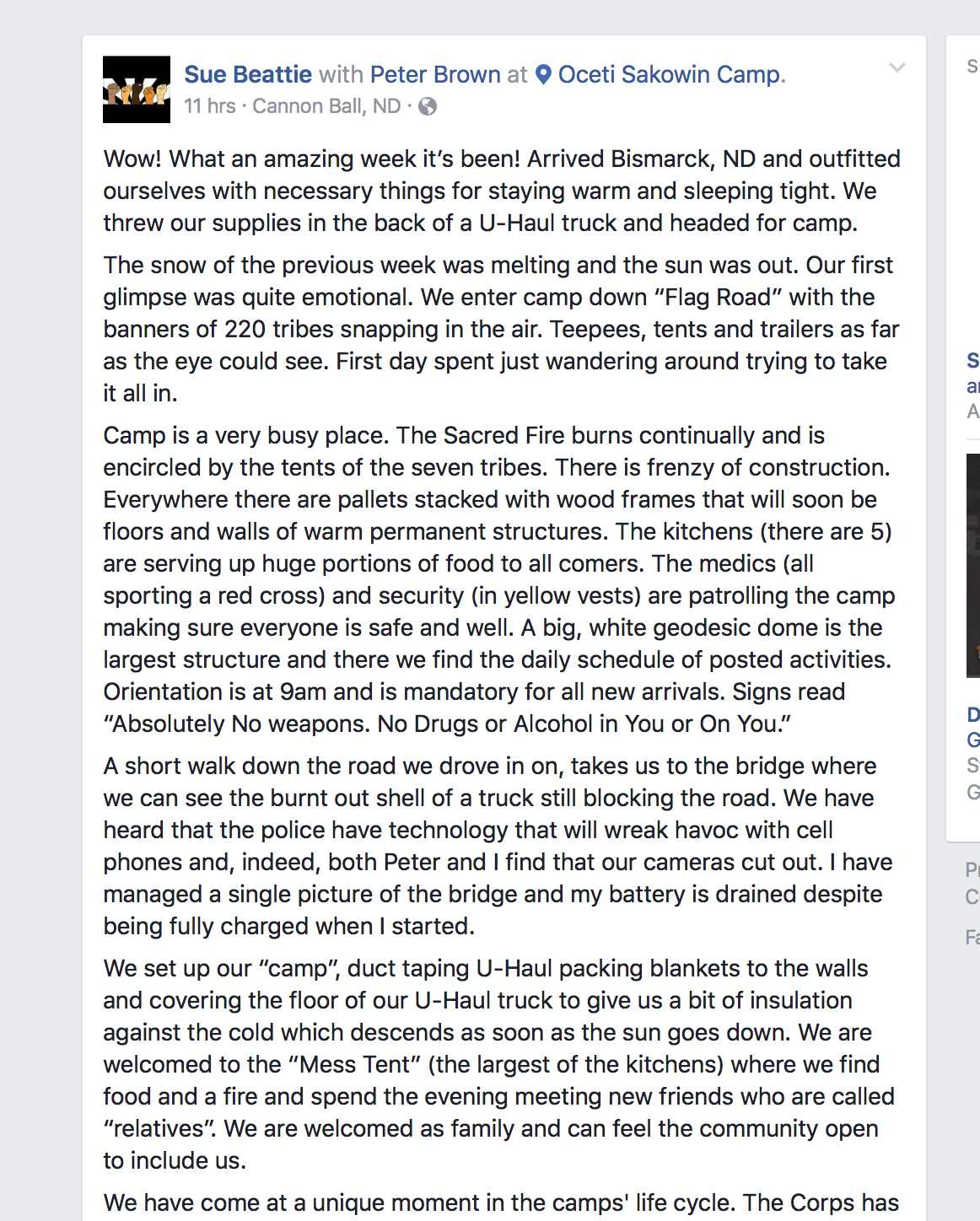 “Wow! What an amazing week it’s been! Arrived Bismarck, ND and outfitted ourselves with necessary things for staying warm and sleeping tight. We threw our supplies in the back of a U-Haul truck and headed for camp.
“Wow! What an amazing week it’s been! Arrived Bismarck, ND and outfitted ourselves with necessary things for staying warm and sleeping tight. We threw our supplies in the back of a U-Haul truck and headed for camp.
The snow of the previous week was melting and the sun was out. Our first glimpse was quite emotional. We enter camp down “Flag Road” with the banners of 220 tribes snapping in the air. Teepees, tents and trailers as far as the eye could see. First day spent just wandering around trying to take it all in.
Camp is a very busy place. The Sacred Fire burns continually and is encircled by the tents of the seven tribes. There is frenzy of construction. Everywhere there are pallets stacked with wood frames that will soon be floors and walls of warm permanent structures. The kitchens (there are 5) are serving up huge portions of food to all comers. The medics (all sporting a red cross) and security (in yellow vests) are patrolling the camp making sure everyone is safe and well. A big, white geodesic dome is the largest structure and there we find the daily schedule of posted activities. Orientation is at 9am and is mandatory for all new arrivals. Signs read “Absolutely No weapons. No Drugs or Alcohol in You or On You.”
A short walk down the road we drove in on, takes us to the bridge where we can see the burnt out shell of a truck still blocking the road. We have heard that the police have technology that will wreak havoc with cell phones and, indeed, both Peter and I find that our cameras cut out. I have managed a single picture of the bridge and my battery is drained despite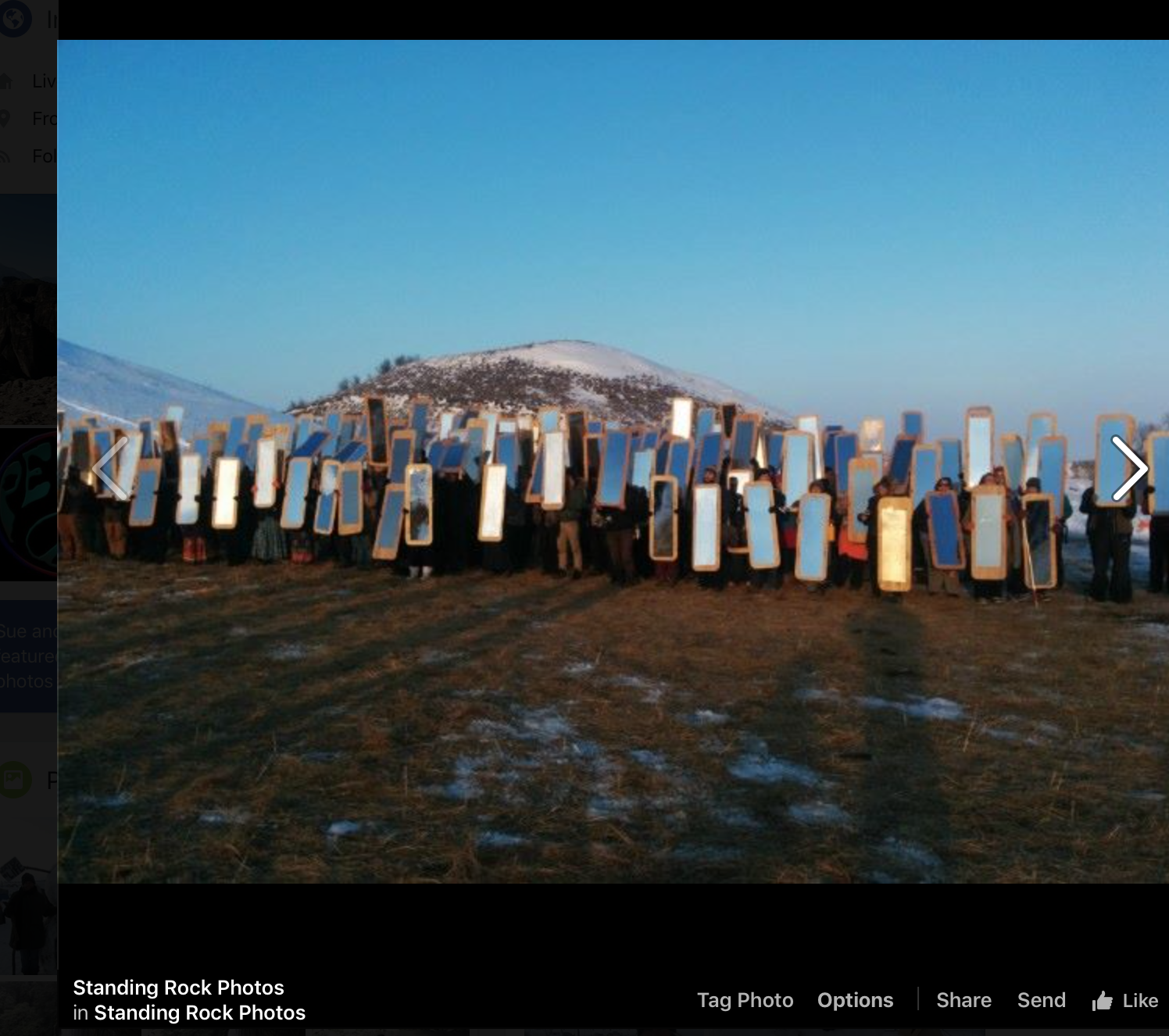 being fully charged when I started.
being fully charged when I started.
We set up our “camp”, duct taping U-Haul packing blankets to the walls and covering the floor of our U-Haul truck to give us a bit of insulation against the cold which descends as soon as the sun goes down. We are welcomed to the “Mess Tent” (the largest of the kitchens) where we find food and a fire and spend the evening meeting new friends who are called “relatives”. We are welcomed as family and can feel the community open to include us.
We have come at a unique moment in the camps’ life cycle. The Corps has said that as of Dec. 5th anyone still in camp will be “trespassing”. The Morton County sheriff has threatened to use all means necessary to clear the camp. The Vets are trickling in and rumor has it that there will be at least 2,500 arriving in camp in the next few days.
We can see about a kilometer down the road leading into camp and there is a line of cars stretching as far as the eye can see. People are streaming into camp to make their stand here with the Dakota/Lakota water protectors.
The orientation meeting is about more than how to find your way around camp and speaks strongly to the “allies” in camp about how to deport oneself in an “Indigenous Centered” movement. White privilege and decolonization are addressed head on. For the next few days, allies will outnumber the Indigenous but it is the Indigenous who lead this movement with their insistence that this be a peaceful and prayerful gathering.
This land on which we camp was originally reservation land that the US government later decided they wanted to repossess. The Lakota people have never ceded their right to this land to America. They will not do so now.
We attend a “Direct Action” training. There are no weapons in camp and all participants are schooled in non-violent confrontation. The legal team is well organized and everyone who intends to risk arrest through Direct Action is to fill out a “jail form” so the legal team knows how to proceed should there be arrests. We write the telephone number for the legal team on our arm with a “sharpie” and find change to carry in our pockets so that we can get a hold of them on pay phones if we find ourselves jailed for our action.
Rory Wakemup has brought a truckload of “mirror shields” that will reflect back to the attackers their own image in hopes that they might be ashamed to see themselves perpetrating such extreme violence on peaceful Water Protectors. When raised to the sky, reflecting the sky, the shields look like the flowing river. We plan to make the river flow from where it runs to the camp.
Despite the fact that the FAA has ruled the camp a “no fly” zone, the tribe has several drones and drone pilots. This is 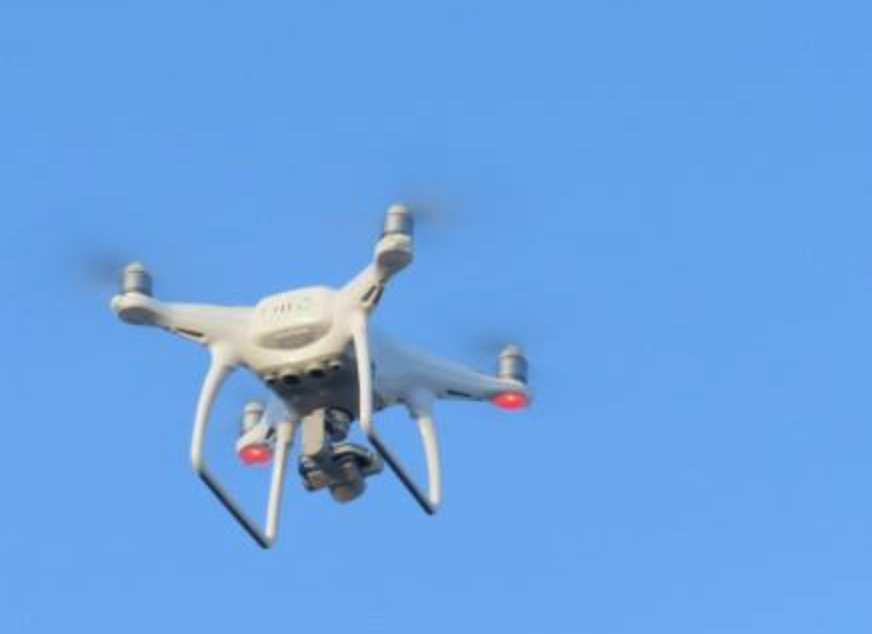 unceded treaty land and the FAA has no jurisdiction here. The drones are extremely important as they provide the footage that clearly shows the Water Protectors to be unarmed and peaceful and the militarized police as the aggressors. The drones fly up and down the line of Water Protectors as they learn to navigate their mirror shields. Rory will upload this footage.
unceded treaty land and the FAA has no jurisdiction here. The drones are extremely important as they provide the footage that clearly shows the Water Protectors to be unarmed and peaceful and the militarized police as the aggressors. The drones fly up and down the line of Water Protectors as they learn to navigate their mirror shields. Rory will upload this footage.
And then, unexpectedly, there is the announcement that the Corps will not grant the easement. Peter and I had been walking from the Sacred Fire to our truck. Peter had stopped to play baby games with a small child being towed in a sled. From the microphone at the Sacred Fire I hear there will be an announcement. I wander back toward the fire to listen. Peter wanders back toward the truck.
“I have no details” says the Indigenous leader on the mic, “but I can tell you that the Corps has announced that they will not grant the easement.” There is stunned silence and then wild cheers as the impact of this amazing reversal sinks in.
The camp is huge. Only those of us at the fire have heard the news. As I go to find Peter, I tell the people I meet along the way what I have just heard. There is shock, followed by great joy. Hugs and whoops. We are all family and we are all celebrating! The rumor is that the following day we will walk to the drilling platform. Peter wants to dance on the drill site.
People are still streaming into camp. Thousands of Vets are here. Dozens of new tents have sprung up literally overnight.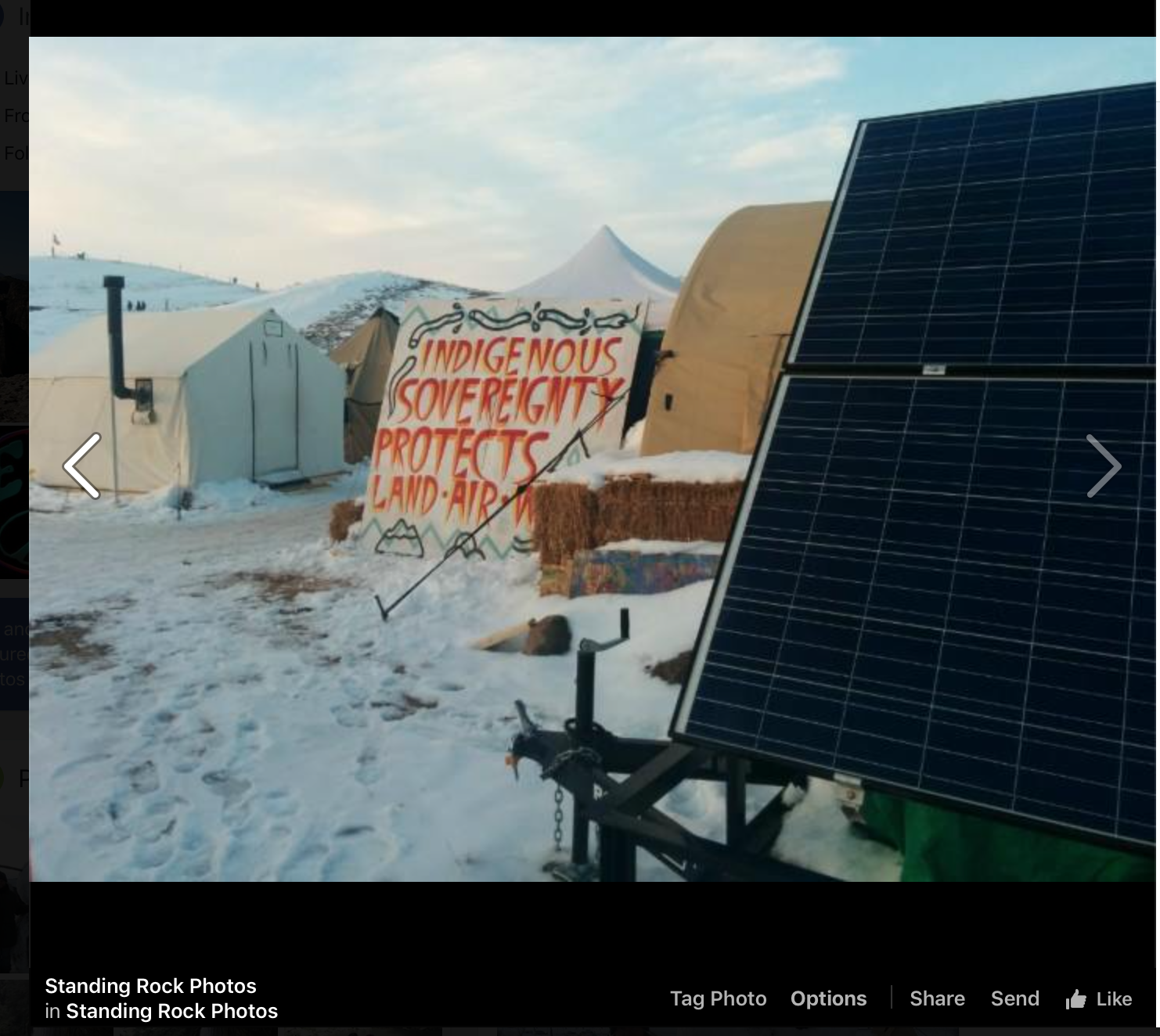 A conservative estimate puts about 12,000 people in camp on December 4th. Everyone is fed. Everyone has a place to sleep. Everyone has access to warm clothes and bedding.
A conservative estimate puts about 12,000 people in camp on December 4th. Everyone is fed. Everyone has a place to sleep. Everyone has access to warm clothes and bedding.
The arrival of the Vets has made the camp a bit less tranquil. They have come to “protect” but, to my eyes, they seem to want to take control. They march and carry the flag. There are some fights. I think they are also completely caught off guard by the Corps announcement. Perhaps their arrival was the final nail that caused the Corps to relent.
This is an Indigenous victory and the Indigenous graciously, profusely and sincerely thank the Veterans for their support. We hear from the Sacred Fire that with this decision they will “forgive” the US Army for the murder of Crazy Horse and Sitting Bull. They will “forgive but not forget”. In return, the US Army will give the Lakota a White Horse, a symbol of lasting peace and goodwill. I have no idea if this will come to pass but the Veterans in camp, the 7th Cavalry, kneel to the Dakota/Lakota and apologize for genocide. We dance the “Round House” dance late into the night.
There is press conference the next day. Energy Transfer Partners has said that the decision of the Corps changes nothing. They will not stop drilling. We do not walk to the drilling platform. It is not clear how this will play out. The head of the Tribal Council says we should all go home and be warm with our families. Trust the system. At the same time, he says we may all need to return in January. When has the system ever worked for the Native Ameri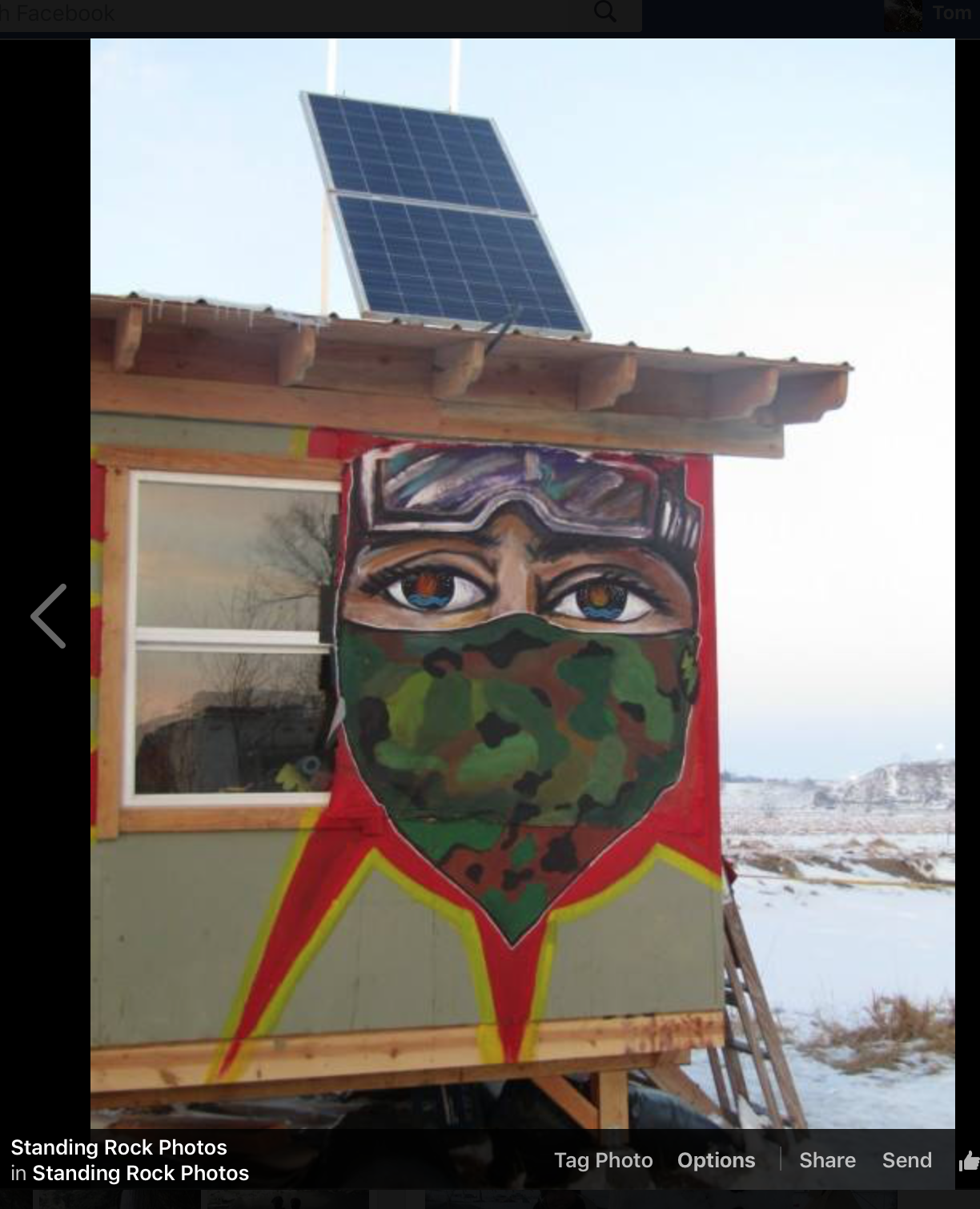 can? There are other voices, strong and determined, that say they will remain until the drill is gone and the project is stopped. We will wait and see. The weather has turned. We are in the throes of a full-on blizzard by the time the press conference has ended. The temperature has plummeted. The wind is gusting. The snow is swirling.
can? There are other voices, strong and determined, that say they will remain until the drill is gone and the project is stopped. We will wait and see. The weather has turned. We are in the throes of a full-on blizzard by the time the press conference has ended. The temperature has plummeted. The wind is gusting. The snow is swirling.
People are still arriving. Other people are leaving. The Vets are leaving. We are thankful for our U-Haul truck which will protect us from the wind and weather. It is very cold as we crawl into our sleeping bags but we have a small propane heater and sufficient bedding to stay warm, even toasty. We listen to the wind as it howls through the cracks and snaps the banners on Flag Road. We will wake to another day of extreme cold and wind. This is the day we are to leave but the roads are closed. Our U-Haul truck is good protection from the weather but it is not safe on the road. With rear wheel drive and no chains, it will not even manage to climb even a small hill. So we have missed our flight and spend another night in our trusty U-Haul, thankful for the protection. Sleeping warm and dry.
The next day (our last in camp) dawns clear and cold. There is a trace of blue in the sky but the temperature is at -7 and the wind chill is 40 below. I grew up in Wisconsin. I lived in Montana and Upstate New York. I know cold… but I have forgotten. I have never tried to live outdoors in this weather. It is extreme but, once again, the camp functions. Security goes tent to tent to ensure that the occupants are safe and warm (enough). There is always coffee and hot food. The supply tents have racks of warm clothes and sleeping bags. The fires are stoked and people come and go warming hands and drying mittens. The wind dies down a bit and we decide to try to drive the truck “around the block” just to see what that feels like.
It feels like this might be the moment to try the 40-mile drive back to Bismarck. It takes a half dozen tries to get up the hill that takes us from camp to the plowed road but we gain the road and creep back to Bismarck. The 40-mile journey takes us 2 ½ hours. There a few tense, slippery moments but we arrive, whole and unscathed… but not unchanged.”
Many thanks to Susan for this insider’s glimpse of life at Standing Rock.
Over Thanksgiving break, the Periclean Class of 2017 received some difficult news from the University of Namibia (UNAM). According to our university contacts, UNAM is no longer able to provide their previously designated portion of financial support for the conference. This means that as a class, we would be responsible for raising an additional US$10,000, a fundraising task that we are simply unable to fulfill.
Bearing such heavy news, we devoted the entirety of our class to debriefing our sentiments and searching for an answer to the question, “so what now?”
As members of the Periclean Scholars program, we are strongly opposed to merely giving money to a charity or cause; this is against the principles and ethics of aid that we have spent so many years studying. It would be both unsustainable and uninvolved, to an extent.
Together, we discussed the current relationships with individuals in Namibia that we already have, as well as options for connections that could be made in the future. Ideas include working with an Elon graduate at N.U.S.T., contacting the First Lady of Namibia since her agenda involves food security, and utilizing other viable contacts.
So, this post does not provide answers, conclusions, or finite plans in moving forward. We cannot say what the next days, weeks, and months will hold as a cohort. However, we will work hard to turn this obstacle into an opportunity.
Yes, I am suggesting that you do some ‘homework’ related to your responsibility as a Periclean Scholar. Your time is very valuable, but I promise that what I am asking you to do will be useful to you.
Your assignments
I hope that this coming week will be filled with rest, relaxation and time for reflection for all Pericleans. I can safely assume that many of you will reunite with family and friends at a Thanksgiving meal and have the opportunity to have conversations with relatives, neighbors and those that you left behind when you came to Elon.
Assignment #1
You will be asked “how are your classes going?” and that will lead you into talking about your work as a Periclean Scholar. Like many, I have found TED talks to be a great source of both information and inspiration. This one featuring Bennington College President Liz Coleman will deepen your elevator speech both about Periclean Scholars specifically but more generally on the purpose and value of a liberal arts education. She does this talk just after President Obama’s 2009 inauguration, and some of what she says should resonate with you and also help you to understand what our nation -and our world- needs from us as members of a civil society and as global citizens. She gives great, timely advice; this video is well worth the 18 minutes you’ll spend watching.
Assignment #2
The current election results will most certainly be a topic of conversation around the dinner table and in other contexts. As Pericleans we have made a statement on our Facebook page reaffirming our commitment to each other, those who are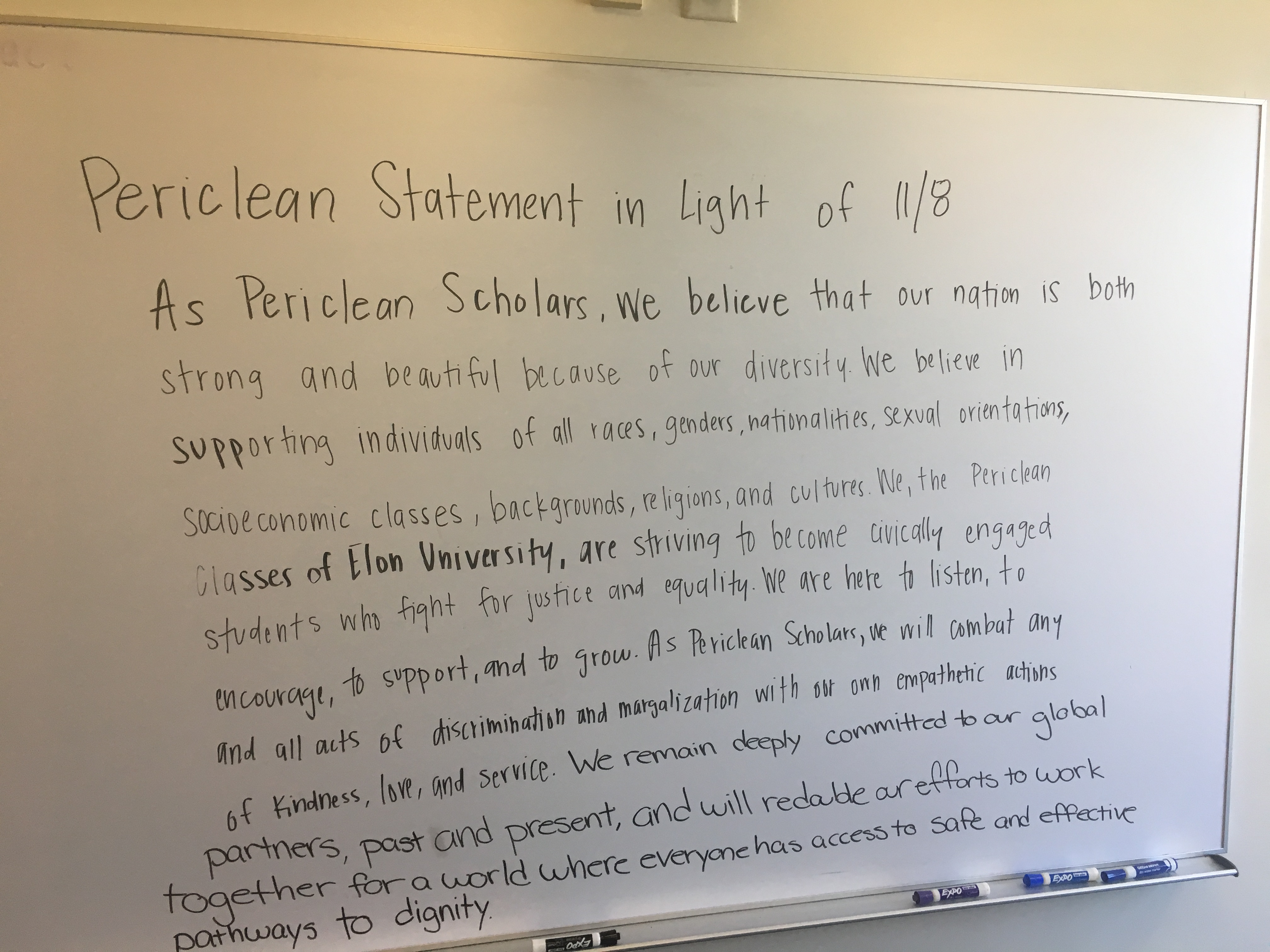 marginalized and to our partners. That we are a nation divided on some fundamental levels seems acutely obvious. Our response must be to make every effort to understand ourselves and all those with whom we share this nation and this planet. This next TED talk was done after the recent election and speaks to the divisions in our nation with measured, proactive reasoning and solid research. The final minutes include good, sound and very timely advice for you as you head out for break.
marginalized and to our partners. That we are a nation divided on some fundamental levels seems acutely obvious. Our response must be to make every effort to understand ourselves and all those with whom we share this nation and this planet. This next TED talk was done after the recent election and speaks to the divisions in our nation with measured, proactive reasoning and solid research. The final minutes include good, sound and very timely advice for you as you head out for break.
Our charge
One of my favorite quotations is from Mahmood Mamdani in his book Saviours and Survivors. On page 5 he writes, “In contrast to those who suggest that we act the minute the whistle blows, I suggest that, even before thew whistle blows, we ceaselessly try to know the world in which we live -and act. Even if we must act on our imperfect knowledge, we must never act as if knowing is no longer relevant.” Indeed. Let’s all have a great break filled with learning, listening, sharing and a thirst to join with others in our common goal of creating a more just world for all.
As Periclean Scholars, we believe that our nation is both strong and beautiful because of our diversity. We believe in supporting individuals of all races, genders, nationalities, sexual orientations, socioeconomic classes, backgrounds, religions, and cultures.
We, the Periclean Classes of Elon University, are striving to become civically engaged students who fight for justice and equality.
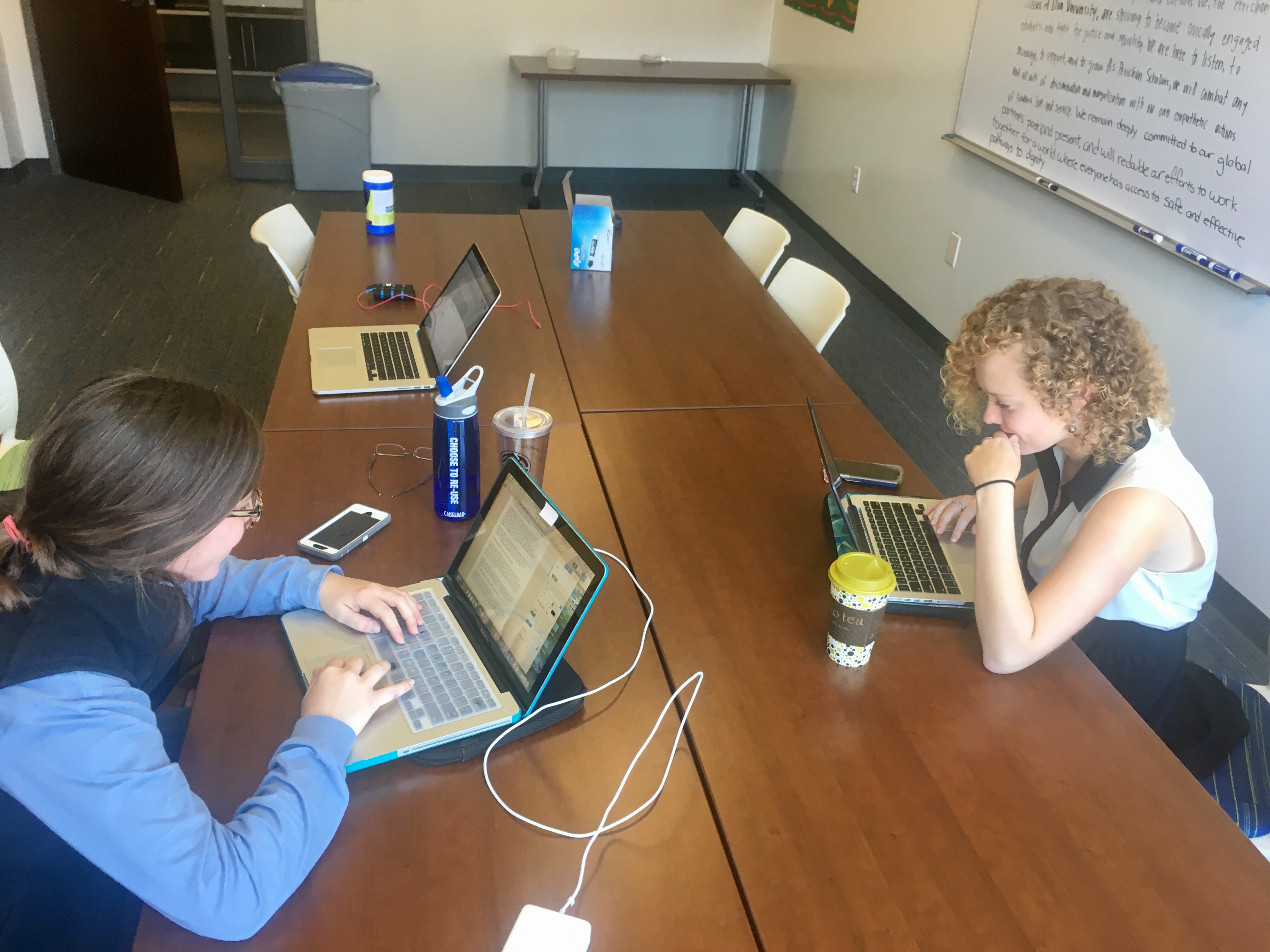
We are here to listen, to encourage, to support, and to grow. As Periclean Scholars, we will combat any and all acts of discrimination and marginalization with our own empathetic actions of kindness, love, and service.
We remain deeply committed to our global partners, past and present, and will redouble our efforts to work together for a world where everyone has access to safe and effective pathways to dignity.
Today in class, our 2017 Periclean cohort successfully tied up a few loose ends, preparing for our final fundraisers (Cookies to Go-Go, and Meal Swipes) and trips to The Burlington Housing Authority, and solidifying a few ideas for our Spring Project.
We will be hosting our final Cookies to Go-Go event for this semester next Wednesday on November 9th. Be sure to order your cookies and support our Voices of Sustainability Conference! Similarly, our Meal Swipes fundraiser, taking place December 5th- 9th, will also be benefitting Voices of Sustainability.
While in class we also were able to confirm that we would have Pericleans at The Burlington Housing Authority for these last few weeks until the end of the semester. This was exciting for our cohort because it will mark a full semester of us positively contributing to our local community. In addition to continuing our relationship with The Burlington Housing Authority in the spring, we have been wanting to take on something else for our local spring project. So far our thoughts have been centered around hosting a festival of some kind at The Burlington Housing Authority. This festival could look something like a health and wellness fair for the children we have been working with this semester. As a cohort, we also tinkered with the idea of giving the students we have been working with this semester a project for them to complete and then teach their families about at the end of the semester through a presentation or poster fair. It is very important to us to have input from The Burlington Housing Authority before we move forward with any local project for the spring, so until we hear back from our contact we will continue to brainstorm new ideas for our spring project.
Towards the end of class we had a guest speaker, Dr. Cahill, come to our class to speak about the philosophy of ethics and how we can use the tools she provided us to help with our restorative plan for our Periclean cohort. Dr. Cahill spoke of a spectrum that could help us identify our individual and cohort feelings about our actions taken while pursuing the KIND Grant; one end of the spectrum signified feelings of wanting to “sweep it under the rug” and not recognize how big of a deal it was, while the other end of the spectrum signified feelings of wanting to punish ourselves for our actions repeatedly and having it create shameful and negative feelings towards ourself. After explaining the basics of the spectrum, Dr. Cahill opened her presentation up to us for questions and discussion.
In order to continue to thoughtfully move forward after this presentation, I think that each member of our cohort needs to really think about where we fall on that spectrum in regards to our actions with the KIND grant. In addition, I think that going forward we will all need to be cognizant of each other’s feelings and attempt to help each other with the healing and restorative process. I am hopeful that this will bring us closer as a cohort and will truly be a teachable and transformative moment for each of us.
Peace, Love, Periclean.
Shay & Periclean 2017
The Class of 2017 is working to plan and solidify details for a conference that will take place in Namibia in January 2017. This conference will be an interactive environment for university students and professionals to share knowledge on techniques for developing food security particularly in Namibia but also in all parts of the world. This conference has allotted time for students to share their personal research on related topics. Students from The University of Namibia and Elon University will conduct research to be presented at this conference. As an integral part of Periclean Scholars Program we also strive to educate and share our learning with our own community. We have decided a good way to do this is to present our research again at Elon University through SURF Day, the undergraduate research presentation day. Below is a summary of the topics that Elon students will be researching in small groups to present.
To begin, our class chose to look at the very foundation of the work we are doing. One group of students will investigate the sustainability of food aid programs in the United States and Internationally. There is a debate in global spheres about sustainability and the line between crisis and development aid and how addressing food security falls along that line and in what situations. This group of students are looking to present on the ‘best practices’ of sustainable food aid at the conference in Namibia and also to the Elon Community on SURF day.
Alongside the many projects a group of students will research current information about the psychological effects of lack of access to food on people. As a class we feel that we have learned and the community is more aware of the physical and economic effects of lack of access to food, but there seems to be a gap in the conversation about the psychological effects of food insecurity. This team of students hope to fill this gap of information to make ourselves and the Elon community more aware of the data and research behind the psychological effects that much of our community may feel from living in a food desert and having lack of access to food.
As part of our projects a team of students are filming a documentary that brings light to the topic of food security and how different institutions are working towards improving food accessibility. Filming for the documentary began in June 2016 when a group of students traveled to Namibia to meet with contacts and begin developing the storyboard for the documentary. The documentary is anticipated to be finished in April 2017. With this deadline, the research team hopes to showcase clips of the film as part of the SURF presentations as well as give a presentation regarding the steps taken to film this documentary and the challenges that were faced by the team.
Another topic that we explored was the ethics of aid. More specifically, how the United States and other Western nations fail to take into account certain ethical, social and cultural ideals when delivering aid to African countries. Billions of dollars are poured into foreign aid, accomplishing things from providing economic foundations to bricks and mortar projects in small communities. There is a diverse array of state and non-state actors that contribute to foreign aid, yet despite the influx of money on these issues and regions, corruption continues to persist. And it isn’t exclusively corruption from the side of African nations, but elements of our system of aid are flawed which has allowed for the opportunity of corruption and manipulation to exist. This research aims to understand and analyze these key factors.
Narrowing the focus to Alamance County, another project will be focused on food deserts and food insecurity within Elon’s surrounding communities. Many students wouldn’t notice it traveling within a certain radius of Elon, but the outer reaches of Alamance County are struggling with access to food. One problem is the disconnect between more rural and isolated areas of Alamance county and the lack of markets or grocery stores in that area. Not only that, but other types of unhealthier foods are becoming more accessible with the increase in fast food within the county. It’s cheap and comes in large portions, with trade offs being the unhealthy manners in which the food is prepared. This is another issue our class is exploring.
Finally, our class will explore the relationship between HIV/AIDS and food. For people living with HIV/AIDS, it’s important to sustain one’s healthy living through a balanced and nutritious diet. This is important and applies to all people, but even more so for those HIV positive. The problem occurs when the communities where HIV positive people live are food insecure. This adds many problems that disproportionately affects those living with HIV. Another group of Periclean students will be exploring HIV/AIDS in Africa especially in the context of food deserts and food insecurity.
During our visit to BHA, Caila, Christian, and Cam had a tremendous time and think the children enjoyed the class as well. We began with a brief presentation on how to live sustainably, which the kids were very engaged in and seemed to enjoyed. We asked them various questions about what sustainability means, and how they can play a role in living in an environmentally friendly way.
Following this presentation, we facilitated multiple activities with a focus in recycling and repurposing. The first activity was “sustainability bowling”, where we divided into two teams and played traditional ten pin bowling (with a certain leniency on the rules) where the “pins” were made at of totally recyclable items. After that, we did a word search where every word in the answer key had to do with recycling and sustainability. The final activity, which we did not fully complete, was a sorting activity where students sorted between objects, determining which ones were recyclable and which were not.
On the whole, the kids seemed to thoroughly enjoy the activities and were very engaged throughout the hour. They especially enjoyed “sustainability bowling” because they got to move, jump around, and interact with one another; they didn’t want it to end! Oppositely, the kids got a little antsy while doing the word search, and some got a little bit frustrated after a few minutes. We could tell that the more engaging the activity was, the more likely they were grasp the lesson and be engaged.
Additionally, we very much enjoyed the hour, including the lesson and activities. It was awesome to convey information we have focused upon as part of our Periclean cohort. Having the kids be so receptive to it was as added bonus and reinvigorated our passion for the project.
Suggestions for future groups:
– Be flexible with activities and rules!! This makes it much more fun for the kids because they do not respond as well to rigidity.
– Be well-versed with the lesson beforehand
– Focus more on activities that get the kids up and moving around
– Try to build on previous lessons and link them together!
– Meet with your team beforehand to strategize
Caila
The biggest thing that I learned at the BHA was how to harness my inner-child; how to see the world with a sense of childlike wonder. I absolutely LOVED watching the kids get so into our lesson about sustainability! They came up with the most creative ways to be more environmentally friendly, and it was so fun to catch a glimpse into how they think. So many people discount the ideas of kids because they think “what do they know, they’re just kids,” but I think that they bring a whole new perspective to the table!! I even picked up some ideas on how to recycle more and save more energy like only buying things at the store that come in recyclable packages.
I also learned that kids get the most out of what they’re being taught when the instructor is FLEXIBLE!! This is key! If you go into the BHA with a strict agenda, script, and time frame…it’s not going to happen. These kids are full of life, joy, and laughter. They want to talk, engage, and play! Usually I am one that likes to stick to a plan, but I really learned how to be flexible and let the conversation go where ever the kids took it.
I LOVE working with the BHA, and I can definitely see that the kids have gotten things out of the previous lessons. They were relating things we talked about to previous weeks, and even asked about other Pericleans that had been there before. It is encouraging to hear that they remember us, and more importantly, remember what we are teaching them!
Cam
Reflecting on our visit to BHA, my major takeaway was simply a reigniting of my passion for our project and Periclean as a whole. To see young kids really buying into the information presented was really incredible, even if what we presented was only adjacently related to our work. I have always enjoyed working with kids, having three younger brothers and working in the past as a summer camp counselor, so the trip to BHA was a much needed break from my life at Elon even for just an hour. It was a very enjoyable experience.
On the whole, the lesson plan went over well with the kids and they were very engaged. I will say, it is very important to remember that at the end of the day the lesson is for them, and it is not critical every single detail is retained by the kids. It is meant as a fun experience for the kids and if they learn even one thing from the lesson, it should be considered a success. We taught on sustainability and I believe the kids walked away from the class a little more conscious about the subject and how they can live sustainably each day. In this way, the class went very well.
In conclusion, I had a great time at BHA and it was awesome to do some hands-on service as part of Periclean. I would encourage anyone who has not gone yet to do so, as it is a great experience.
Christian:
When preparing for the presentation we would be giving to the Burlington Housing Authority, I reflected on my past experiences working alongside kids. Through all the experiences I’ve had with camp counseling and tutoring, one thing that has stood out was the idea of being “child-like” as opposed to “childish”. Being child-like suggests enthusiasm and energy that many young kids have whereas childishness is more related to immaturity and whiny behavior.
It was important then to employ that child-like enthusiasm while giving the presentation on sustainability. Motivating the kids to speak up and engage with the material was for more effective when I showed my interest in the topic through body language and guiding questions. The kids contributed great ideas and were really creative and thinking outside the box with their responses. On top of that, they just brought a lot of spirit and energy to the classroom which just made for a very fun experience. Overall, I definitely would recommend this experience as it was inspiring to listen to the kids’ feedback as well as being a fun environment to present in.